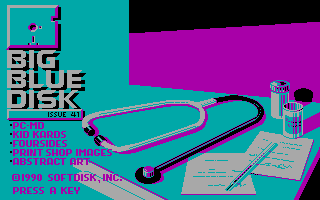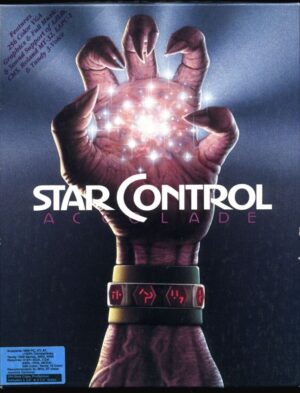Retro Replay Review
Gameplay
Big Blue Disk #41 delivers a varied gameplay experience by bundling two distinct titles—Kid’s Kards and FourSide—each catering to different tastes. Kid’s Kards offers a simple yet charming card-matching and collecting system. Players flip colorful cards to find matching pairs, keeping track of special “bonus” cards that grant extra points or mini-challenges. The mechanics are easy to learn, making it suitable for younger audiences or anyone looking for a light mental exercise.
(HEY YOU!! We hope you enjoy! We try not to run ads. So basically, this is a very expensive hobby running this site. Please consider joining us for updates, forums, and more. Network w/ us to make some cash or friends while retro gaming, and you can win some free retro games for posting. Okay, carry on 👍)
In contrast, FourSide takes the action up a notch with fast-paced shooting and puzzle elements. You pilot a four-sided craft through geometrically themed arenas, blasting hostile shapes and navigating tight corridors. The game encourages reflex-based play and pattern recognition, as enemies spawn in predictable sequences but require split-second reactions. FourSide’s difficulty curve ramps up steadily, balancing brief learning stages with adrenaline-pumping boss encounters.
Beyond the two games, Big Blue Disk #41 also includes SpeedBrake, a system slow-down utility created by John Romero. While not a game per se, SpeedBrake integrates seamlessly into the menu, allowing older or faster PCs to run DOS titles at an enjoyable pace. Its inclusion acknowledges hardware disparities and ensures that the disk’s games—along with any other software you throw at it—play reliably, widening the audience for this subscription issue.
Graphics
Visually, Kid’s Kards embraces a bright, hand-drawn aesthetic. The card faces display simple illustrations—animals, shapes, and playful icons—that evoke the cozy feel of a children’s book. Animations are minimal but effective: cards flip with a quick “woosh,” and matched pairs sparkle briefly before disappearing. The color palette is bold and well-contrasted, preventing confusion even after prolonged sessions.
FourSide leans into a retro arcade look with geometric sprites and smooth vector lines. Its backgrounds shift between neon grids, abstract landscapes, and starfields, giving each level a distinct identity. Enemies are represented by colorful polygons that rotate, scale, and pulse, providing a mesmerizing visual rhythm. Despite the era’s hardware constraints, the game achieves fluid motion and clear hitboxes—critical for precision shooting gameplay.
The overall interface of the Big Blue Disk menu merits praise as well. A horizontally scrolling list displays icons for each title, SpeedBrake, and supplementary utilities. Clip art and article thumbnails pepper the sides, adding visual variety without cluttering the screen. The design feels appropriately ’90s but remains navigable, with legible fonts and high-contrast selections ensuring no mis-clicks when browsing through software offerings.
Story
Neither Kid’s Kards nor FourSide is driven by a deep, narrative-heavy plot, yet both games weave light thematic elements into their design. In Kid’s Kards, the “story” is abstract: you’re a collector racing against time to pair whimsical cards before the deck reshuffles. The game hints at an unseen “cardmaster” who rewards strategic thinking, adding a playful sense of progression as you unlock hidden card sets.
FourSide’s premise is similarly minimalist. You assume the role of an interdimensional pilot tasked with cleansing four parallel realms of hostile shapes. Brief introductory text sets up a cosmic conflict, but the narrative dissolves into pure action once the levels begin. Despite the lack of cutscenes, the changing environments and enemy designs suggest a loose storyline of escalating challenges, keeping players motivated to reach the end.
Beyond the games, the disk’s magazine-style content—including an article reviewing Qix—provides historical context and gaming lore. Reading about Qix’s influence on modern arcade titles enriches your appreciation for FourSide’s geometric combat and Kid’s Kards’ strategic simplicity. This editorial layer gives Big Blue Disk #41 a quasi-narrative backbone, as you move from playing to reading and back, creating a well-rounded journey through early ’90s software culture.
Overall Experience
Big Blue Disk #41 excels as a snapshot of its era, offering more than just two playable titles. The inclusion of SpeedBrake demonstrates thoughtful curation, ensuring that hardware limitations don’t hamper enjoyment. This utility alone is a boon for retro gamers who juggle various DOS configurations, making the disk a practical addition to any collection.
The mix of games, articles, and clip art invites exploration. After a gaming session, you can skim editorial pieces, browse cartoon assets, or test out non-game utilities. The magazine’s structure encourages a leisurely pace—play a few rounds of FourSide, then switch to reading about arcade classics or tinkering with SpeedBrake settings. This variety prevents fatigue and caters to different moods.
For prospective buyers, Big Blue Disk #41 represents excellent value. You get two unique games, a professionally coded utility by John Romero, insightful articles, and miscellaneous software extras—all accessible through a polished menu interface. Whether you’re a collector of vintage disk magazines, a DOS gaming enthusiast, or simply curious about early ’90s shareware, this issue delivers an engaging, multifaceted experience.
 Retro Replay Retro Replay gaming reviews, news, emulation, geek stuff and more!
Retro Replay Retro Replay gaming reviews, news, emulation, geek stuff and more!






Reviews
There are no reviews yet.